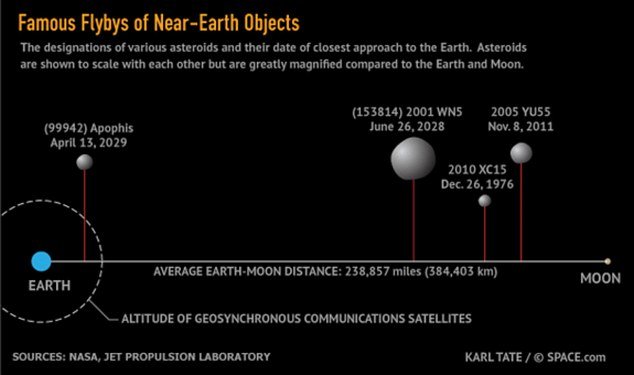
2005 YU55, an asteroid the size of an aircraft carrier whistled past Earth at a distance of 202,000 miles away, slightly nearer than the moon, on November 8.
The asteroid is the largest such object to come so close in 35 years but NASA said ther is no chance of impact with the space rock known as 2005 YU55.
NASA has been monitoring the quarter-mile-wide asteroid as it approached Earth.
The researchers will now analyze radar images to uncover further details about the rock, which was first spotted in 2005 by the University of Arizona.
YU55 asteroid’ surface is coal black and it spins slowly through space. It travels at 30,000 mph and was last this close to Earth some 200 years ago.
The last time a large cosmic interloper came that close to Earth was in 1976, and it won’t happen again until 2028.
However, it was bad news for all but the most committed of stargazers. It was not visible to the naked eye – even at its closest point to Earth it was about 100 times dimmer than humans can observe naturally.

If somebody wanted to catch a glimpse of YU55 asteroid as it passed by, the person would have needed a telescope with an aperture of at least six inches and to be out of a city or away from any light pollution.
Sky & Telescope magazine published charts that show YU55’s progress through the constellations.
Scientists at NASA’s Deep Space Network in the California desert have tracked the quarter-mile-wide asteroid since last week as it approached from the direction of the sun at 29,000 mph (46,671 kph).
Yesterday, NASA offered two places to take a closer look at the action – Asteroid And Comet.
Scientists tracked YU55 with antennae of the agency’s Deep Space Network at Goldstone, California, and the Arecibo Planetary Radar Facility in Puerto Rico.
The Clay Center Observatory in Massachusetts planned an all-night viewing party so children and parents could peer through research-grade telescopes and listen to lectures.
The asteroid can’t be detected with the naked eye.
For those without a telescope, the observatory streamed video of the flyby live on Ustream, attracting several thousand viewers.
If an asteroid that size were to hit, the impact would carve a crater four miles (6.4 km) across and 1,700 feet (518 metres) deep. And if it slammed into the ocean, it would trigger 70-foot (21-metre) high tsunami waves.
The space experts recently estimated that more than 90% of the near-Earth asteroids wider than 0.6 miles have been identified, but that thousands of asteroids in YU55’s size range remain undetected.
For a lighthearted look at our close encounter, Facebook features countless event pages, and the asteroid even has its own Twitter account (@AsteroidYU55). Search for YU55 or #YU55 for a plethora of tweets.
[youtube cIwX0Qeid9o]
[youtube Z0GuRj1ve1M]